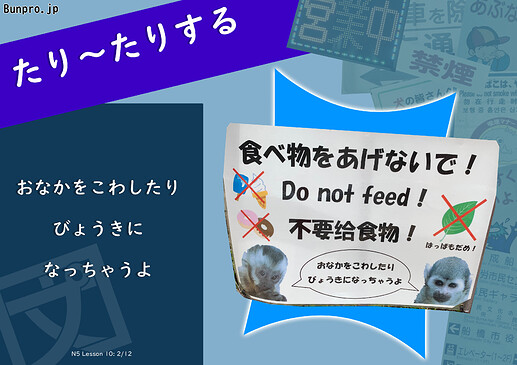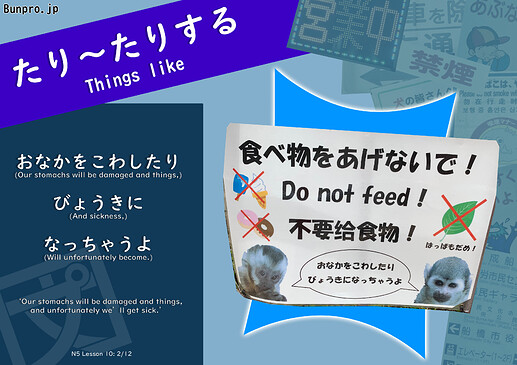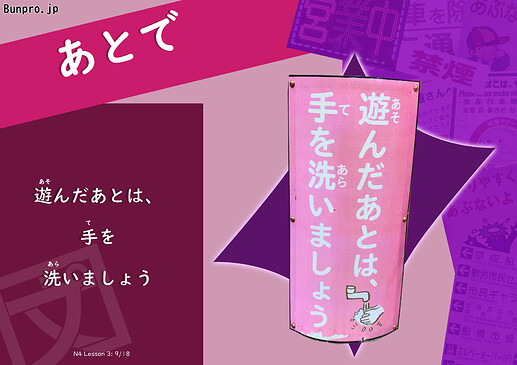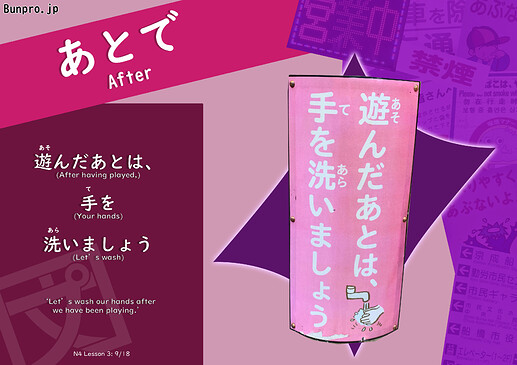July 29th
...
It will hurt our stomach or something and we’ll get sick!
Summary
(Things such as this) will hurt their stomach and they (animals/monkeys) will become sick (without meaning to).
友達とおしゃべたり、日本酒を飲んだりした。
Translation
Literally: If you do such things as break my stomach I will get ill.
Natural English: I will get poorly if you upset my tummy.
I used the words ‘poorly’ and ‘tummy’ because this message is clearly aimed at children, as it is all written in hiragana and there is a fun speech bubble. The たり in this sentence shows the children that it might not only be an upset tummy that they are giving the monkeys.
🍌🍧🍃🍩
(Please) do not give food! 食べ物をあげないで!
Do not feed!
不安給食物 (What is this? Is that third Kanji even right?)
Leaves are also bad! はっぱもだめ!
We might make ourselves get sick or have a stomachache!
Ok, I was planning on skipping this time but my spite lookup of なっちゃうよ made me take this in a slightly different direction from the gang. Because of the speech bubbles the subject here are the monkeys, so I went with ‘we’ on my subject. The なっちゃう, assuming I understand that point correctly, suggests unintentionally becoming X, eg. the monkeys don’t know any better and will eat whatever is given to them.
I like matt_in_mito’s interpretation, but rather than saying it’s aimed at children I prefer to think of this sort of thing as an attempt at guilt tripping everyone (adults and kids) into better behavior by making it seem as if we could be hurting kids/friends. Because of that I feel fine wrapping up おなかをこわしたり → stomachache since I get the impression they just want to make the monkeys seem childish and unable to care for themselves regardless of the actual audience.
Edit: I should probably point out that I feel fine disregarding the たり in this case. I just don’t think there’s a need to focus on it and I think it’s fairly normal in health related things to assume other complications are possible.
For people stuck on なっちゃう like I was
After being confused and getting not helpful results from Jisho I finally did a google search, getting this forum post Learn Japanese Forum - なっちゃう
which at a glance lines up with N4 L8 てしまう・ちゃう | Japanese Grammar SRS
And of all the things… that was literally the next grammar point I was supposed to study. I actually decided not to do lessons this morning because I had to take my car to the mechanic 
不要給食物 - Seems like the same warning but in Chinese. Google translates it as “Don’t give food”
Translation
It will hurt our stomach and we’ll get sick!
Not sure how to properly convey the ~たり nuance here 
Edit / Take two
I’m now wondering if the first sentence is meant to modify びょうき and thus it would instead translate to:
We’ll get sick with a stomachache or something!
Translation
It will hurt our stomach among other things, we will become sick unintentionally (… oops / by mistake. なっちゃう could also mean we will become very sick ).
July 29th Translation
Notes: When たり is used in sentences like this, it can be a bit confusing at first. In English, the ‘single’ たり has a similar nuance to ‘ohhh (verb) ya know?’. This probably sounds a bit odd, so let’s look at an example. Let’s pretend you go to a friends house, and you say ‘So what are you up to today?’. Their reply is ‘Ohh… Chillin, ya know!?’. Here it just shows that ‘while -chilling- is something they are doing, it is not strictly the only thing’. It is important to differentiate this from ‘and stuff/and things’, because these translations always imply that there ‘are’ other things. たり ‘may or may not’ have other things, similar to ‘ohh…ya know?!’.
Oooooohhhh~ Neat.
⚽
After we play let’s wash our hands.
⏰
起きたあとは、寝ていましょう!
Not sure how wrong that is, but I couldn’t resist.
Edit: Matt’s story… I’m dying here  I’m sorry, but that sounds straight out of a comedy
I’m sorry, but that sounds straight out of a comedy
Summary
Wash your hands after… playing?
遊ぶ has such a wide meaning so this could mean anything depending on the context haha
Also, 〜しましょう translates as ‘let’s〜’ but it’s used in so many different contexts in Japanese that doesn’t always imply that. One of the funniest ones was when my doctor said 運動しましょう. He didn’t want to exercise with me, he was telling me very politely that I was too fat 
Summary
Let’s wash our hands after we play (wash your hands after you play).
翻訳した後で、その文法ポイントで日本語の文を書いたほうがいいですよ。なぜ僕はだけしかいない?
Edit:
@ccookf 
s1212z's bonus line
After translating, it’s better to write Japanese with this grammar point (these grammar points?). Why am I the only one?
I hope I got this right. The last bit with だけしかいない was not familiar to me and half the search results brought up a similar, but different point using しか~ ない. Also, I think it’s because you’ve got massive… amounts of courage. You know I mean!

Summary
@ccookf L9 17/22 in N3 is the entry for だけしか—ない
Sounds good to me, it’s a soft suggestion to write practice writing after translating . And emphasis on only ‘me’ as bordering on despair 
No shame here. Learning Japanese is more of giant lesson in humility that happens to have some actual language learning mixed in 
Translation
After playing let’s wash our hands
Use case
これを書いたあとで仕事をしに戻ります
...
Wash your hands after playing!
Liberal translation
(Q) What do we do when we’re finished playing?
(A) We wash our hands!
Bonus
後で片付けてあげるから存分に遊んでね。
Translation
After playing, lets wash our hands!
July 30th Translation
Notes: Good translations yesterday! While ましょう does not always mean let’s as in ‘both of us right now’, it does usually mean let’s as in ''This is generally something that would apply to anyone". This ‘let’s’ is also used quite often in English this way, like a parent saying ‘let’s remember to look both ways before crossing the street!’. What the really mean is ‘everyone should’.




